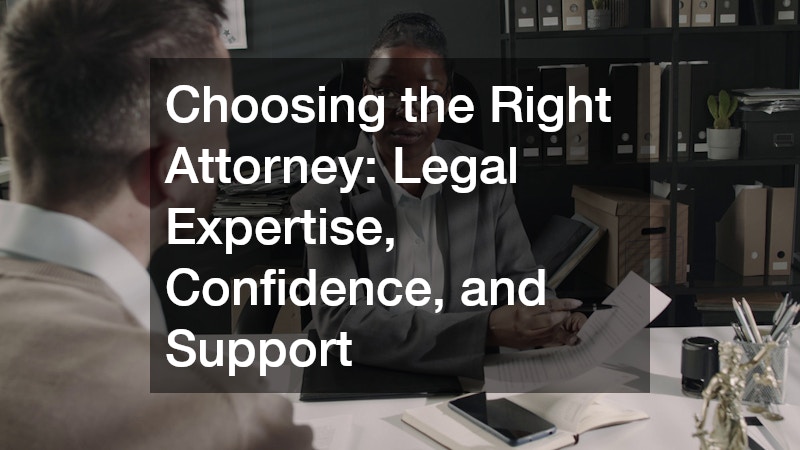How to Choose the Right Personal Injury Attorney

Choosing the right personal injury attorney can make a significant difference in the outcome of your case. With many options available, it’s essential to know how to evaluate and select the best attorney to represent your specific needs. This article will guide you through the key considerations for making an informed decision.
What Qualities Should You Look for in a Personal Injury Attorney?
Experience and Expertise
Finding an attorney with a proven track record in personal injury cases is crucial for the success of your case. Look for someone who has practiced for several years and has a commendable success rate.
An experienced attorney is likely to understand the nuances of personal injury law more thoroughly. They can anticipate potential challenges and preemptively address them, improving your chances of a favorable outcome.
Additionally, attorneys who specialize in personal injury cases may have valuable insights that a general practitioner might lack. They could offer strategic advice that aligns specifically with the intricacies of personal injury law.
Communication and Accessibility
The ability to communicate effectively with your attorney is integral to the success of your legal proceedings. An attorney who is accessible and keeps you informed about the progress of your case fosters trust and builds a strong client-attorney relationship.
Timely communication ensures that you are updated on important developments, enabling you to make informed decisions as your case unfolds. An attorney who prioritizes transparency can help diminish the stress and uncertainty often associated with legal processes.
Such transparency also allows you to understand the legal strategies being employed and the rationale behind pivotal decisions. Choosing someone who values your input and feedback can further personalize and strengthen your legal strategy.
How Can You Verify an Attorney’s Reputation?
Client Reviews and Testimonials
Reading client reviews and testimonials can give you an honest insight into an attorney’s effectiveness and reliability. Former clients’ experiences can shed light on both the strengths and potential weaknesses of a legal professional.
Online platforms and legal directories often contain detailed feedback from previous clients. These resources can highlight an attorney’s ability to meet clients’ expectations and handle cases effectively.
Moreover, consistent positive feedback can corroborate an attorney’s claims of competence and success. It also provides qualitative evidence that complements quantitative data like win rates and years of practice.
Professional Credentials and Associations
Checking an attorney’s credentials and memberships in professional legal associations is an excellent way to gauge their credibility. Being part of reputable associations often indicates a commitment to ethical standards and continuous learning.
Credentials, such as board certifications or recognitions, often reflect an attorney’s expertise and dedication to their field. A well-credentialed lawyer likely has undergone rigorous assessments to prove their competency.
Membership in professional associations can also facilitate access to a network of experts and resources. This connectivity can enhance your attorney’s efficacy and provide additional leverage in your case.
What Are the Costs Involved in Hiring a Personal Injury Attorney?
Contingency Fees and Billing Practices
Many personal injury attorneys work on a contingency fee basis, meaning they only get paid if you win your case. This arrangement often eliminates the need for upfront fees, making legal representation more accessible to clients who might otherwise be unable to afford it.
However, it’s crucial to understand the percentage your attorney will take from your settlement or award. Additionally, inquire about their specific billing practices to avoid any surprises and ensure that you are fully informed before signing any agreement.
Some attorneys may charge additional fees for specific services or expenses during your case, such as court filing fees, expert witness costs, or document processing. Understanding these billing practices can help you budget for potential costs effectively and prevent financial strain as your case progresses. Always ask for a clear explanation of what is and isn’t included in the contingency agreement.
Understanding Possible Additional Charges
In addition to contingency fees, you might incur other charges such as filing fees, expert witness costs, and court expenses. Being aware of these potential costs is vital for avoiding financial stress during your case.
Discussing these details upfront with your attorney can prevent unforeseen financial burdens. Ensure they provide a detailed breakdown of any anticipated expenses and clarify who will cover these costs initially.
Some attorneys might offer to absorb these additional expenses until a settlement is reached. This arrangement can be beneficial, but make sure to clarify the terms and repayment conditions.
Choosing the right personal injury attorney requires careful consideration of their qualities, reputation, and fees. By thoroughly evaluating these aspects, you can ensure you have the best possible representation for your case.
Remember, the right attorney should provide not only legal expertise but also the confidence and support you need during this challenging time. Choosing wisely will significantly impact your legal journey and its outcome.




